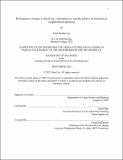Participatory Zoning: Collectivity, contradictions, and the politics of inclusion in neighborhood planning
Author(s)
Lee, Gina Hanhee
DownloadThesis PDF (11.69Mb)
Advisor
Steil, Justin
Terms of use
Metadata
Show full item recordAbstract
The strength of individual property rights and the sovereignty those rights secure means that even a collective of neighborhood residents successfully engaging with public institutions are highly unlikely to achieve outcomes that undermine private interests in property and profit. Yet, revised attempts at participation continue to be made and the participatory planning paradigm continues to be entrenched. This thesis aims to show that, despite the limited—maybe even predetermined—outcomes of resident participation in land use decision-making, their engagement in such processes generates alternative ways of using land use regulation as tools for spatializing collective survival and even sovereignty. It offers critiques of current participatory planning processes but also reveal incentives for continued resident participation in municipal neighborhood planning decisions.
Through a case study of participatory land use and zoning decisions over five decades in Two Bridges, this thesis analyzes the formations through which residents engage in public processes and asses how property relations and transformations in broader planning contexts structure those engagements. It traces a genealogy of processes and outcomes on one particular site to evaluate the emergences and institutionalizations of participatory formations and the adaptations in representation and modes of participation by shifting local collectivities.
Date issued
2022-09Department
Massachusetts Institute of Technology. Department of Urban Studies and PlanningPublisher
Massachusetts Institute of Technology